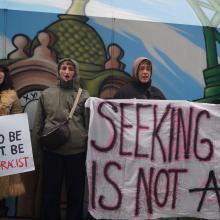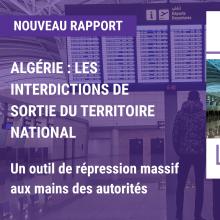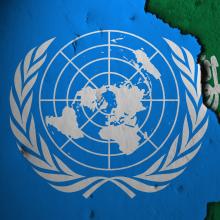28 يوليو 2020

His Excellency Ambassador Abdulaziz M.O. ALWASI, Permanent Representative of Saudi Arabia to the UN in Geneva
His Excellency Mr. Abdallah Y. Al-Mouallimi Ambassador Extraordinary and Plenipotentiary, Permanent Representative of Saudi Arabia to the UN in New York
28 July 2020
As a Human Rights Council candidate, Saudi Arabia should make concrete commitments to promote and protect human rights
When electing States to the Human Rights Council, General Assembly resolution 60/251 calls on States to take into account candidates’ voluntary pledges and commitments, and their human rights records.
A State’s membership in the Human Rights Council is an important opportunity to strengthen the promotion and protection of human rights for all at the national, regional and international levels. Through Council membership, States commit themselves to “uphold the highest standards in the promotion and protection of human rights,” and to fully cooperate with the Council and its mechanisms.
Candidates are expected to put forward voluntary pledges and commitments on what they will achieve as members – at both domestic and international level – which should inform voting States’ decisions of whether to support them in the election.
In this context, our organisations urge Saudi Arabia to commit, as part of its candidacy to the Council, to implement a series of measures which we detail in the annexes to this letter. One opportunity to publicly commit to implementing them is the annual pledging events that ISHR and Amnesty International will hold in September 2020.
We will disseminate the information in the annexes to all UN Member States to inform their voting in the Council elections due to take place in October 2020 at the UN General Assembly.
We will also closely monitor Saudi Arabia’s implementation of these measures throughout your membership term, if elected.
Sincerely,
- ALQST for Human Rights
- Americans for Democracy & Human Rights in Bahrain (ADHRB)
- Amnesty International
- CIVICUS: World Alliance for Citizen Participation
- European Saudi Organization for Human Rights
- European Centre for Democracy and Human Rights (ECDHR)
- Gulf Centre for Human Rights (GCHR)
- International Service for Human Rights
- MENA Rights Group
- Migrant-Rights.org
- Women’s March Global
Key measures Saudi Arabia should commit to implement as a Human Rights Council member
The following measures were developed jointly with several civil society organisations:
Human rights defenders and civic space
Human rights defenders, journalists and prisoners of conscience are detained for exercising their rights to freedom of expression, peaceful assembly and association, and for engaging with the UN human rights mechanisms. Some of them – including women’s rights defenders and activists - have been subjected to severe acts of torture and ill-treatment as detailed in numerous reports, and perpetrators have not been held accountable. We urge Saudi Arabia to:
- Immediately release all those detained for exercising their rights, including, but not limited to, the individuals named in this letter (see annex II), to drop all charges against them, provide them with remedy in line with international standards, and hold perpetrators accountable.
- Indicator to measure implementation: Release, dropping of charges against the 84 named individuals in Annex II, remedy provided to them in accordance with international standards, and accountability for those responsible for their torture.
- All cases of reprisals and intimidation in the UN Secretary-General’s report are resolved.
- All Opinions issued by the UN Working Group on Arbitrary Detention are implemented.
Saudi Arabia-led Coalition in the context of the Yemen conflict
The Group of International and Regional Eminent Experts on Yemen have found that the governments of Yemen, the United Arab Emirates and Saudi Arabia, as well as the Houthis and affiliated popular committees, have enjoyed a “pervasive lack of accountability” for violations of international humanitarian and human rights law. We call on Saudi Arabia to:
- Heed the call by the UN Security Council on “all parties to armed conflicts to engage immediately in a durable humanitarian pause for at least 90 consecutive days, in order to enable the safe, unhindered and sustained delivery of humanitarian assistance, provisions of related services by impartial humanitarian actors and medical evacuations.”
- Fully comply with the relevant provisions of international humanitarian law in the planning and execution of any military operations. They must ensure that civilians and civilian objects are not targeted, and take necessary precautions to distinguish between civilians and combatants and between civilian objects and military objectives and end indiscriminate and disproportionate attacks;
- Allow full and unfettered access to organisations providing humanitarian aid and essential services;
- Ensure that prompt and full reparation is provided to victims and families of victims of unlawful attacks which resulted in human or material damage.
- Indicator to measure implementation: The assessment by the Group of Eminent Experts in their reports to the Human Rights Council of Saudi human rights violations and efforts at accountability.
Death penalty
On 26 April, the Kingdom's Human Rights Commission announced, by royal decree, reforms of the criminal justice system which curb the death penalty for some child offenders. However, the decree which has still not been officially published, contains notable exceptions which empties the reform of its substance. First, it only appears to protect child defendants sentenced to death under ta'zir (i.e. at the discretion of the judge). Citing the Juveniles Law of 2018, it therefore excludes death sentences for other categories of offences known as hudud (i.e. fixed punishments for specific crimes prescribed under the country’s interpretation of Islamic law) and qisas (i.e. retributive justice – usually for murder).
Furthermore, according to the published text, the latest royal decree also excludes those convicted for ta’zir under the counter-terrorism law, a law that has significant shortcomings, and criminalises acts of peaceful expression. As such, minors can still be executed under these three counts. Finally, even for those cases the royal decree appears to cover, no death sentences have yet been commuted. We call on Saudi Arabia to:
- Commute the sentences of Ali al-Nimr, Dawood al-Marhoon, Abdullah al-Zaher, and one other, who all have received ta’zir death sentences or final death sentences and could be executed at any time
- Withdraw the request for death penalty in the trials of Mohammed al-Faraj and eight other facing death sentences for crimes committed as minors
- Issue a public commitment to never demand the death penalty in any form whatsoever against a person for any crime they are alleged to have committed as a minor
- Abolish the death penalty for drug offences in law and commute the death sentences of all those convicted of drug offences in line with the retrospective application of this law;
- Indicator to measure implementation: monitoring announcements by the government of death sentences against persons convicted of drug crimes, and issuance of new legislation abolishing the death sentence for drug crimes.
- Ratify all outstanding human rights treaties and their individual complaints mechanisms.
- Indicator to measure implementation: Ratification of CAT-OP, CCPR, CCPR-OP2, ICPPED, CESCR, CMW and their individual complaints mechanisms.
Male guardianship system
Women human rights defenders have long fought for their rights to seek equality in their country. On 2 August 2019, the Saudi government issued amendments to the male guardianship system published.
This amendment allows women to obtain passports and travel abroad without permission of their male guardians, grant women the right to register marriages, divorces, births and deaths, to obtain family records and benefit from new protections against employment discrimination.
However, the male guardianship system has not been dismantled, but instead continues to negatively affect all aspects of women’s lives, severely restricting their fundamental liberties. Women cannot freely decide about their education, employment, health or who they want to marry. In addition, Saudi women cannot pass their nationality on to their children and, in the absence of laws to protect women from domestic violence, many remain trapped in abusive relationships.
Furthermore, many of the women who have strived in parallel to end the male guardianship system and patriarchal laws for years or decades were arrested in a wide scale crackdown in 2018 prior to lifting the driving ban by Saudi Arabia. Around two dozen of those women and their supporters remain in prison, and others who were freed abide to the threat of being detained again.
We call on Saudi Arabia to fully dismantle the male guardianship system in law and practice which considers women as ‘legal minors’, including by moving quickly to:
- Amend policies that restrict women’s access to jobs, accommodation, educational opportunities, marriage, divorce, and health care, and their ability to pass on citizenship to their children, without permission from a male guardian
- Amend policies to allow release of women and girls from prison or shelters where they have sought protection from domestic abuse or violence without approval of their male guardians
- Indicator to measure implementation: CEDAW Committee’s assessment during the next periodic review.
- Remove male guardians ability to “recall” women and girls back to their homes by filing a report of ‘uquq’ (the charge of ‘disobedience to parents’) or taghayub (absence);
- Cooperate, in good faith, with Saudi women human rights defenders to monitor and assess the implementation of these reforms.
- Indicator to measure implementation: CEDAW Committee’s assessment of the situation of women human rights defenders during the next periodic review.
Accountability for the extrajudicial killing of Jamal Khashoggi
The UN Special Rapporteur on extrajudicial executions has found the State of Saudi Arabia responsible for the murder of Saudi journalist Jamal Khashoggi and concluded that the trial of alleged perpetrators in Saudi Arabia was “anything but justice”. Those responsible for ordering his murder must be held accountable, in addition to those who executed him. We call on the Saudi government:
- Take meaningful steps towards accountability for the murder of Jamal Khashoggi, by accepting an independent international criminal investigation in to his murder.
- Indicator to measure implementation: The acceptance of an independent international criminal investigation into Khashoggi’s murder and collaboration with and support of the international investigation.
Migrants workers’ rights
Migrant domestic workers, who number at least 3.6 million, endure excessive working hours without a break, are isolated, and are victims of wage theft. Domestic workers are not covered by the labour law, and encounter obstacles to accessing justice including linguistic, racial, gender and nationality discrimination. Migrant workers, especially domestic workers, are subject to losing their legal status in the country at no fault of their own. Sponsors can file absconding charges without evidence, which immediately renders these workers’ visas irregular. Irregular workers are subject to unfair trials and indefinite detention.
- We urge Saudi Arabia to fully incorporate domestic workers under the labour law, implement adequate enforcement mechanisms, facilitate their access to the justice system, enable workers to freely move between sponsors and leave the country at will without permission from their employer.
- Indicator to measure implementation: Saudi Arabia includes domestic workers fully in the labour law; and prevents employers from filing absconding charges after a complaint has been filed against them.
Labour Courts and Ministry of Human Resources Offices should provide a welcoming, secure and culturally-appropriate environment for victims of labour abuse, especially for women. They should be equipped with translation and public defence services for those who cannot afford it.
- We call on Saudi Arabia to publish statistics regarding labour dispute cases, disaggregated by nationality, gender, type of work, verdict and other indicators.
- Indicator to measure implementation: Official statistics on all reported labour disputes are published disaggregated by nationality, gender, type of work, and verdict.
Female migrant workers are particularly vulnerable to unfair and disproportionate prosecution under Zina rules that criminalise sex outside of marriage. Zina rules are not codified and are arbitrary, falling under the complete jurisdiction of judges. Zina rules are often used to silence victims of labour and sexual abuse and can result in indefinite detention, including victims of rape.
- We urge Saudi Arabia to issue a moratorium on punishments under Zina rules until a penal code is codified and immediately release individuals detained under these rules.
- Indicator to measure implementation: A moratorium on punishments for alleged Zina offenses is imposed; and Saudi Arabia makes public the list of those released from detention.
Millions of migrant workers are vulnerable to forced labour because of the Kafala system, which ties workers’ employment and legal residency to an individual sponsor. Workers require permission to change jobs and leave the country, making it difficult to challenge or leave abusive employment conditions. The UN Special Rapporteur on poverty has noted that women in particular are at the mercy of the employer’s own preferences and her guardian’s goodwill. He also stressed that the Government has the responsibility to provide for a legal framework that guarantees the full respect for migrants’ human rights and ensures accountability for violations. The High Commissioner after Saudi Arabia’s last UPR had also reiterated this and called for a review of the sponsorship system, in keeping with international standards.
- We urge Saudi Arabia to delink migrant workers from the control of a single sponsor, and abolish the Kafala system and allow for greater employment mobility for migrant workers. Workers’ resident visa status should be linked to the State, and only the work permit should be linked to the employer.
- Indicator to measure implementation: Abolishment of the Kafala system in law and practice; Saudi Arabia removes sponsorship by individuals, and delinks residency visa and work permits; and allows workers to change jobs without employer’s permission.
All migrant workers require an exit visa, permission from their employer in the form of a no- objection certificate, in order to leave the country. This lends employers undue control over workers movements and can leave workers stranded in the country for years.
- We urge Saudi Arabia, which is the last country in the Gulf Cooperation Council to require exit visas, to abolish this requirement and ensure all migrants enjoy freedom of movement.
- Indicator to measure implementation: Exit visas are abolished without exceptions.
Despite modest reforms in recruitment processes, the migrant domestic labour market is rife with recruitment-related abuses. Saudi Arabia should engage with recruitment offices in the country, raise their capacity to detect and identify trafficking victims, ensure they have ethical recruitment processes and discipline any violation in this regard. Saudi Arabia should enforce its Trafficking in Persons law and amend it with a clause that explicitly criminalises forced confinement. Few cases of trafficking in persons are investigated every year despite evidence of a large number of violations of the Trafficking in Persons Law.
- Saudi Arabia should enhance the capacity of its labour inspectors, judiciary and law enforcement personnel to detect and identify victims of trafficking, facilitate their access to justice and redress and investigate and persecute perpetrators of human trafficking.
- Indicator to measure implementation: Saudi Arabia shares details of number of inspectors and increases the number of labour inspectors, including women; and establishes a fast-track court/arbitration mechanism for labour cases.
Shepherds, agricultural workers work, and fishermen under gruelling conditions in remote areas of the country, and all are excluded from the labour law. These workers report forced labour, forced confinement, overwork, wage theft, unsafe working and living conditions, among other labour rights violations.
- We urge Saudi Arabia to fully incorporate all such workers into the labour law and ensure enforcement throughout the country.
- Indicator to measure implementation: Shepherds, agricultural workers and fishermen are included into the labour law.
Saudi’s Labour and Residency Laws are strict and discriminatory, with protection gaps that render migrant workers in an irregular status at no fault of their own. Migrant detention centres suffer from overcrowding, lack of hygiene, and basic essentials.
- Saudi Arabia should investigate and close these loopholes, provide a path for workers to regularise their status, and ensure detained migrants receive safe and fair trials. The Saudi government must not only improve the conditions of detention centres, but actively seek alternatives to the massive and aggressive administrative detention system.
- Indicator to measure implementation: Saudi Arabia establishes mechanisms for irregular workers to regularise their status without penalty; and halts the detention of migrants based on their immigration status; and provides transparent data on the number and status of migrant workers in its detention and deportation centers.
Legal framework and due process guarantees
The absence of a criminal code renders prosecution inherently arbitrary as prosecutors can qualify crimes on a discretionary basis. Moreover, despite the amendment made to the Code of Criminal
Procedure in 2013, the latter does not uphold fundamental legal safeguards and, for example, allows security forces to hold criminal suspects in custody for up to six months without judicial review and in incommunicado detention for up to 60 days. Furthermore, broad and vague legal provisions including the Anti-Terrorism law and the Cybercrime Law, criminalise peaceful human rights activism and criticism. We urge Saudi Arabia to:
- Issue a Criminal Code to comply with the principle of lex certa
- Amend its Code of Criminal Procedure to put it in line with international due process and fair trial standards.
- Indicators to measure implementation: Criminal Code is adopted and Code of Criminal Procedure is amended in line with international standards
- Amend Anti-Terrorism law and the Cybercrime Law to put it in line with international due process and fair trial standards.
- Indicator to measure implementation: Recommendations from the Special Rapporteur on counter-terrorism 2017 country visit to Saudi Arabia , are implemented
Finally we urge Saudi Arabia to fully implement all the UPR recommendations and provide a mid-term report on the actions taken.
Annex II attached to this letter.






